Mark Evans interview
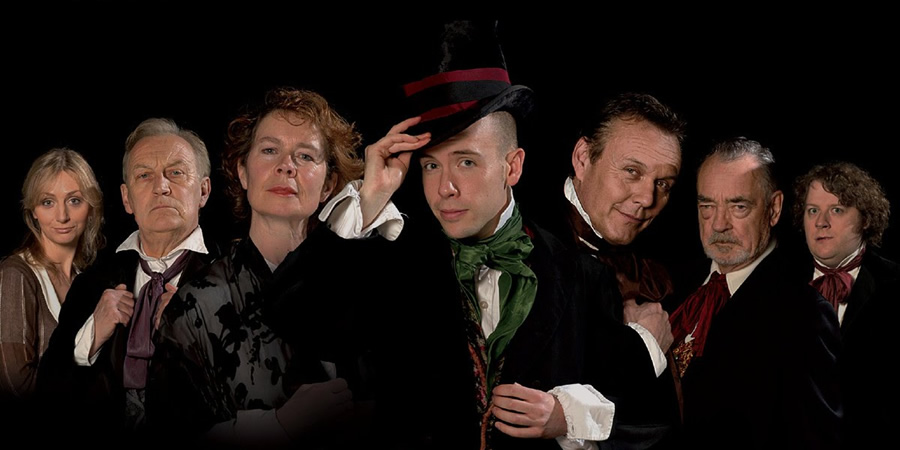
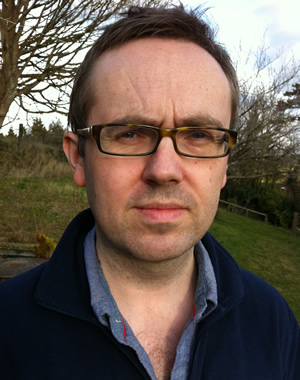
British Comedy Guide rarely uses superlatives, but we're happy to go on record as saying Radio 4's Bleak Expectation is brilliant. Simply brilliant. We spoke to writer Mark Evans (pictured) to find out more about the show. Here's the result of our in-depth chat...
Hi Mark. Perhaps we could start by asking you how you first got into writing comedy?
Hmm... that's a long time ago. Originally, I wanted to join the army. But it turned out they don't want asthmatic infantry officers so that plan was abandoned. I'd always written stuff when I was young - running a school magazine, doing sketches at end of year shows, that sort of thing - but when I went to university I thought I'd end up being a lawyer or teacher.
However, at university I had the most fantastic opportunities to do comedy... and I tried to take them, doing as much as I could. Gradually, I began to realise that this was potentially a career. So on leaving university I became a comedy writer-performer. Or at least a starving, unsuccessful version of one (I was much thinner then). Fortunately, there were still shows such as Radio 4's Week Ending that let absolutely anyone try to write for them, so I started going to their open meetings and submitting sketches. Through that I met people, made friends, gained experience, started getting jobs for no money, then the odd job for a bit of money, then finally got properly paid for things... and that's what I've been doing for the past fifteen years now. Cripes.
As for early projects... well, one of my earliest paid jobs was one I did with James Bachman, when we were paid a ludicrously small amount of money by a production company to write a treatment for a potential series which was to be a Manga-style animation featuring the Spice Girls. Seriously. Nothing ever came of it, oddly. James and I also worked on some sketches for a potential early morning kids' show where the producers decided they wanted to literally do toilet humour - and we ended up writing for two puppet toilets. Nothing ever came of that either, possibly thank goodness. Finally, James and I landed a commission for The Very World Of Milton Jones and a year or so later ended up writing on The Jack Docherty Show - those were my first two 'proper' jobs.
Now, if I answer every question that fully you'll have less interview, more autobiography... how does that sound? And if it's okay, can I have some sort of advance?
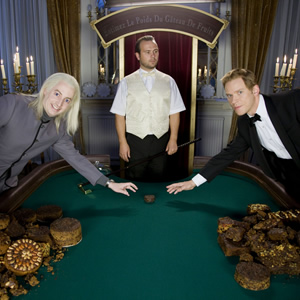
Ha ha. In-depth is good Mark, but moving swiftly on so you hopefully forget the cash... you wrote some great sketches for Mitchell & Webb. Do you have any favourites?
Probably. Let me think... I'm fond of a lot of them. I wrote a couple with Mr Bachman I like a lot... 'German Numberwang', a quickie for an alcoholic sports drink called 'Glucozade Port' (partly because Rob fell over so completely hilariously in it) and also the 'I'm David Mitchell's real chiropractor' sketch; then I'm still proud of the James Bond Casino sketch which I co-wrote with Mr Mitchell himself, and we also wrote another one together that was never filmed called 'French Grandstand' which I still love.
I also particularly like a couple I wrote all by myself: 'Alternative Medicine ER' and also the sketch from the last series where the world is run by a shadowy cabal of people who are slightly drunk - if only because every time I'm in the pub and about half way down my second drink I think 'I could do anything, I feel great' and am reminded that it was quite a good observation.
Oh, yes, that's a great sketch! You've also popped up on screen in various Mitchell & Webb sketches, and on other shows you've worked on. Do you enjoy it? You've never given yourself a lead part...
Yes, I really enjoy it. I'd happily do lots more of it - it's just no-one really asks me... go on, someone ask me. It's much more fun than sitting by myself at a laptop trying to think of something funny - though that said, if I'm ever filming for more than a few days on the trot I do start thinking 'oh, I want to get back to it just being me and the laptop...'
Acting is great fun: they send a car to pick you up; you get to wear fake moustaches and stuff; you get free food; and it's very sociable being on set with the other cast and crew. Oh, and I enjoy saying the words and pulling the faces as well. On the last series of That Mitchell And Webb Look, I even got to pretend I was in an action movie when I got shot three times in the 'Aitch, Not Haitch' sketch. I wrote that, and lobbied hard for the role of man who gets shot just so I could have blood-filled squibs exploding on me and then hurl myself backwards onto a crashmat. Though I then spent the rest of the day lying incredibly uncomfortably covered in sticky fake-blood on a hard floor in a very cold unheated room... so bit of an own-goal there.
I would happily write myself larger parts - it's just, when I do come up with a great cameo I could play, the role often gets cut in later script drafts for time purposes; or is too good for the likes of me. For example, in Bleak Expectations I quite wanted to play the Reverend Godly Fecund... but when I wrote the part, my producer Gareth said 'this might be a good part for David Mitchell...' and because David is so good and such a fine chap I instantly said 'of course' and that's what happened. (And he did it very well, of course.)
In short, yes, I love a bit of acting.
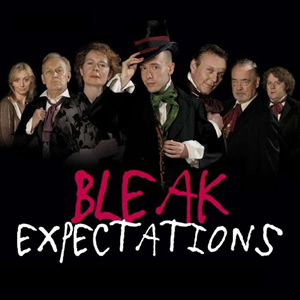
So, going back a bit, how did Bleak Expectations come into existence?
In 2005 I read Great Expectations - and thoroughly enjoyed it, having been a bit lukewarm on Dickens before. I also read a fantastic book called The Quincunx, by Charles Palliser: a massive, brilliant, Dickens-style novel which I highly recommend.
Those books made me go a bit nineteenth century mad for a while, and I thought 'what a great place to set something big, daft and melodramatic'; then when it turned out the BBC were doing Bleak House on TV, I thought 'what about a costume drama... but silly.' So I wrote a slightly strange script, in the first instance for television. Gareth Edwards was one of the producers I sent it to, and he said 'I think this might work better as a radio script...' Because Gareth is right 99.7% of the time, I said 'yes, sir, Mr Gareth,' rewrote it into a radio show and we pitched it to Radio 4. They commissioned a pilot which we recorded in March 2006; that pilot was originally turned down as a series, but the head of Radio Comedy at the time, Paul Schlesinger said, 'oh, but I really like it, can't we do it?' and Radio 4 fortunately changed their minds and a series was commissioned in late 2006, which we made in March 2007. So from idea to series... nearly two years.
Phew! Lucky Radio 4 changed its mind. After a couple of series the programme notably started picking up quite a big following and received more and more glowing praise. You must have been thrilled?
It was fantastic. I hoped people might like the show; it turned out quite a few not only liked it but also loved it. A tremendously gratifying thing. It just meant that heading into writing every series now I think 'ooh, I've got to make this good... people really care' - and I don't want to let anyone down. The fans are so excellent and lovely that I don't want to upset them by doing it rubbishly...
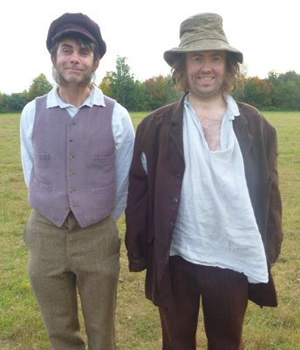
Lots of people will be wanting us to ask you this, although it's admittedly quite a hard one to answer... how do you actually write Bleak Expectations then?
I try to spend as long as I can just thinking, noting down ideas for plots, scenes, jokes, general fun and silly things. Ideally, I'd do that for several weeks; but the world isn't ideal and I often only get to do it for several days. At some point during that process I'll decide what each episode will be - but only in a very brief, general way, for example 'country house murder episode' or 'they go to India'. Then I've got something more specific to think round as I try to think of funny stuff and flesh out those brief ideas into actual stories.
Once I have ideas for the whole series, I'll go and quickly pitch it to my producer, Gareth [pictured on the left with Mark, both of whom are in costume we should add - they don't always look like that]. We'll have a chat and then it's deep breath and jump into the first episode time. I'll write a fairly shoddy one or two page outline with the story written down in pretty crude terms, but enough to act as signposts to get through that first rough, mad draft. And it will be a mad draft. I'm not awfully good at working out the precise details of the plot before writing, so I tend to have to get the story down somehow, then look back and go 'ah, that's how it should go...' But the rough draft is sort of my proof of concept document to myself: there is enough story; and that story provides enough chances for being funny.
At this point I will run it past Gareth. We've worked together long enough to trust each other enormously - so he knows this draft will be long, rambling and insane and I am happy to show him something which might well be filled with notes to myself in block capitals along the lines of 'MAKE THIS FUNNIER' or 'PIP ESCAPES IN YET TO BE DETERMINED FUNNY WAY' or even just 'AAARGHH'. (I would almost certainly never show any other producer this type of draft.) Gareth will comment on the story and usually come up with several elegant suggestions for improving things.
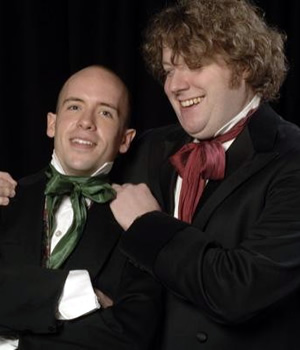
Then it's to the second draft. This will be much tighter and better - I like to think a vast quantum leap of quality from the rough draft. This will mostly be sorting out what happens in the episode: turning it from mere story to proper plot, if you like. Again, this goes to Gareth, and we'll either chat about it or he'll just send some notes. The third draft is knocking off the remaining rough edges, making it tighter to time and ensuring the entire episode works. Then a fourth draft should, with luck, be a case of taking out the last couple of hundred words for time and essentially making it as funny as possible - ideally a couple of days examining each scene and each line and saying 'I know now that this scene is the right one in the right place, but is it being done as interestingly and funnily as possible?' Plus checking that Harry says 'harrumble' and 'swans' at least once an episode.
And that is basically it... do that six times and voila - one series.
To summarise the process... the first draft is like taking scraps of stone and sticking them together to form a block of marble; then the other drafts are chipping away at that to reveal the lean, tautly muscled episode within...
I wish I was better at plotting prior to writing; but at the same time I think sometimes starting a draft while still a little vague about precise story details gives rise to some surprising and interesting stuff that you would never have thought of without just ploughing in. And I think I have finally come to terms with not being the best pre-plotter and accepting that I have my method; it might be mad, but it seems to work. (Excluding all the nervous breakdowns when it's not working...)
As to how long a series takes to write... I think I dream of having a month per episode. But that never happens, and I'd probably just waste the first couple of months thinking 'I've got ages'. In reality, I like to have four and a half months, and most of the series have taken that long. Series 4 was done in about three months flat - but that did nearly break me. I think I put on a stone in the last month just consuming cake and chocolate to try and give me sugar-rush funny. In general there will be a telescoping: episode one will take ages; episode six will be written almost in real time. (Obviously not really, but certainly much quicker - this last series it was done in just under a week. But a really, really diligent week including at least one nineteen hour writing day...)
So, that's quite a detailed answer isn't it? Sorry...
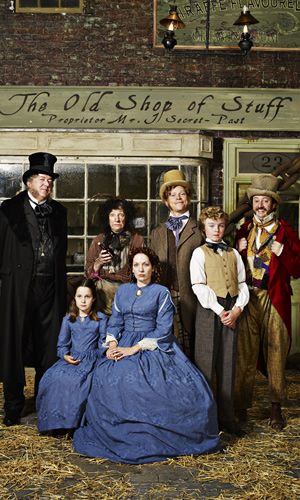
Ah, no, that's really interesting Mark. Thanks for sharing. The Bleak Old Shop Of Stuff was Bleak Expectations' style of comedy, but on TV. It wasn't so well-received as the radio show though. Why did you not transfer the much-loved characters or plot?
That's a complicated thing, actually... essentially, it comes down to money as much as anything. The BBC sensibly didn't want to take a gamble on an entire series without a pilot; but if the pilot didn't work they wouldn't be able to broadcast it and it would therefore be a waste of a lot of money. So the Christmas Special was intended as a broadcastable one-off to act as a backdoor pilot for the idea of a Dickensian sitcom - with luck it would establish the broad idea as a goer, and then perhaps we'd be allowed to make Bleak Expectations off the back of it. Then we did a readthrough of the script for The Bleak Old Shop Of Stuff; and it attracted such a good cast and went down so well that rather than just having a one-off the BBC asked for some more episodes set in that Bleak Old Shop world. Well, no-one's going to turn a chance to make some telly, are they? So Gareth and I didn't, and went and made them.
You're right; it probably wasn't as well received as the radio show. It seemed to divide opinion right down the middle: people either adored it or hated it. The critics were the same, reviews being either love or hate-fests. Which was surprising to me. I didn't think people would actually go so far as to loathe it - but some did. Comedy's odd that way; it does tend actively to upset people more than other genres. (Incidentally, Jonathan Lynn's very interesting on that issue, in his rather splendid little book, Comedy Rules.) But you know what? It was a big, silly show full of jokes, unlike a lot of thing you've seen before, and I think it was rather decent, actually.
Nice answer. So why did you decide against filming in front of a studio audience?
I don't think the Christmas special would have worked as a studio show, actually - it was too long and complicated. Plus, we were aiming for the feel of a proper costume drama, just very, very silly - and that meant going single camera on it.
Actually, at one point the idea was floated of doing the spin-off episodes as a studio sitcom - and on my laptop I have a script for just such a thing. I think it's quite a good script, actually - for complex reasons the Old Shop of Stuff ends up with a railway line going right through it; at the same time son Victor has been sent to a hideous boarding school and the whole thing ends with him tunnelling home all the way to the shop, causing the railway to collapse into his tunnel and thereby saving the shop and inventing the underground. (Probably quite expensive for a studio sitcom but - hey - you've got to aim high before the money people go pale and start shouting at you...)
I think perhaps we underestimated how much the audience gives to Bleak Expectations - that enthusiasm and energy that feeds back to the cast and enhances performances and, more importantly to me, the pace.
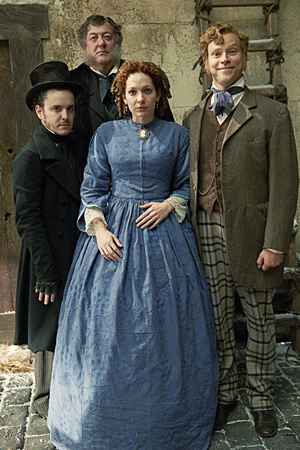
Looking back, do you think there was an unhelpful amount of expectation placed on the show that it could never have lived up to? Maybe a repeat viewing [20th December 2012, 11:20pm, BBC Two, incidentally] might get people to re-assess it now?
I don't know, really... I think it's always hard to come out with something that is somewhat different to the norm - and I do think the show was not really similar to anything else on when it came out. Plus, we were trailed as part of the Dickens season - a perfectly logical and sensible thing to do, but I worry that that put people off, thinking it was high-brow and pompous, when it's really just quite daft. Likewise, maybe some people who watched will have said 'how dare you do this to the master!' and thrown copies of Dickens novels at the screen in rage.
The thing I heard most often after it went out was 'me and my kids loved it' or 'it was great to be able to watch something as a family..' and the show oddly did incredibly well in the demographic of older women (I am obviously the Alan Titchmarsh of comedy writers) so perhaps we weren't quite discovered by enough of that family audience being on later in the evening with a Dickens badge. It was certainly meant to be a family show, so I guess having that repeat close to midnight will really nail that crowd this time...
I think there probably are things I'd change if we went back and did it again - that's one of the reasons I'm disappointed we didn't get a second chance. Everyone learned so much during the process that any second series would have been both slightly different and, I hope, even better. If I could change just one thing I'd do it all the same, but quicker. That period drama pace is brilliant in so many ways, but as a joke writer I worry that it makes the jokes sit up and say 'here I am - judge me!' whereas on the radio it's done so quickly that if you don't like one joke, there's another one there almost immediately - but it's very hard to capture that sort of pace on a non-audience show... I'm obsessed with comedy being done fast, with great pace and rhythm, thus making a good joke great and letting you hurry over any less strong jokes. If you do things slowly, I think almost all jokes become worse. (This is possibly because when I was younger and performing a lot of my own early material in sketches or stand-up, my jokes were less good and I learned to rush through as quickly as possible - but I still think it's a valid theory.)
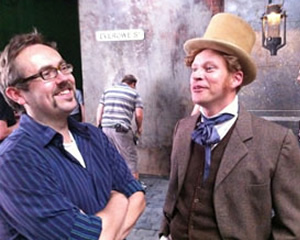
TV is often looked upon as the thing everyone should aim for, but actually, perhaps it could be said radio is the best medium for comedy, with the audio format allowing you to do things you'd never be able to do on TV? (Sorry, that's more of a statement than a question isn't it?!)
Yes, that is basically a statement with a question mark at the end of it... like an Australian interrogative. But I know what you mean. Yes, of course, the radio is a brilliant medium for comedy, letting you do what would be colossally expensive on the TV for the price of a sound effect and the line 'wow, we're in space!' But then on TV you get visual jokes - and, most importantly, people falling over, to me the sine qua non of comedy.
TV is harder though, because there are so many layers for everything to filter through. On radio it essentially goes: good script, good actor, straight into ears and brain. On TV there is more to worry about - is that prop right? How do we shoot this best? Now how do we cut it together for maximum effect? Is that costume distracting in some incredibly subtle way? Is that massive helping of free pudding he ate making James Bachman's timing slightly off? What do you mean we're not allowed to explode a dog, even if it would be really, really funny?
I have rarely if ever come across anyone on a TV crew who isn't incredibly good at their job, but if you have eighteen different bits of stuff to get right under enormous time and budget pressure, it doesn't take much for things to snowball so that you can end up going 'ooh, that's not quite we meant... how did that happen?'
Talking of the radio - joy of joys, Bleak Expectations is currently on Radio 4 for a new series. Is it just us, or have you been putting more puns in this series?
Ooh, I don't know... have I? Um... maybe. 'Train-doori oven' is probably the worst of them. My favourite ones are one towards the end of Episode 5 (it's a physics pun), and the one in Episode 3 where the brilliant Geoffrey Whitehead has just eaten himself entirely and Harry says 'that man is so full of himself', which incidentally was actually almost the very last line added to that script. I typed it, sat back and thought: 'that is either excellent or terrible. I just don't know.' Fortunately, the audience loved it.
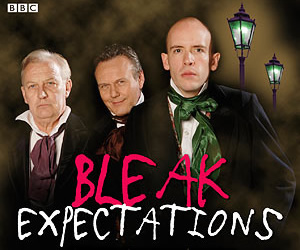
It's not deliberate if there are more puns. They probably just occurred to me. Puns are odd. In one recording this series, there were two rather contrived puns a few pages apart: one got a massive groan, the other a massive laugh turning into a round of applause. And I don't know why one was so obviously better than the other - they looked similarly cheesy on paper. I do enjoy the approach of a pun during the recordings, because it makes me feel a little cheap and dirty, but in a thrilling way. I think it was Alan Bennett who said something like 'audiences groan at puns because they're cross with themselves for not spotting them early enough in time to duck.' I love that.
Anthony Head seems to be loving it more than ever too? He seems to be really revelling in the silliness of it all.
The man is a joy to work with. He thoroughly enjoys himself during the recordings, and is, of course, absolutely brilliant. For this latest series he was trapped filming in Toronto for the last four episodes, and ended up in a Canadian sound-booth doing his lines down an ISDN line - but still managed to capture the joy and energy of his usual performances. (We stuck a picture of his face onto a mop or something and propped it up on stage near the microphone - it was like he was actually there...)
I can sum up Anthony Head quite quickly actually: he is brilliant, and he is lovely. A finer Mr Benevolent and Mr Sourquill I could not imagine.
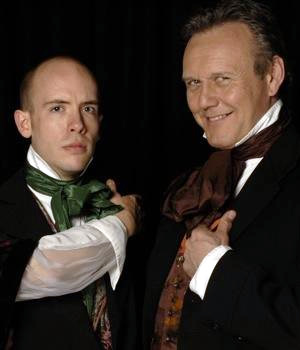
Will Pip ever be able to rid himself of Gently Benevolent? Actually, the latest series suggests he might not actually want to?
What would either of them do without the other? They are each other's raison d'etre. And I really enjoyed the hints that they might occasionally got saucy with each other...
Also, just imagine if he did get rid of him and I had to invent a new villain. How could I do that? It just wouldn't work...
With everyone again raving about how good it is, we're alarmed to hear that this might be the last series? Is that a false rumour?
It's nice to see good feedback on forums and Twitter. (Though there is one individual who seems to write something rude about the show on Twitter every episode - switch your radio off then! If you don't like it, stop listening! Plus, I was always taught 'if you can't say anything nice, don't say anything at all...' But Twitter's not like that is it really? Sorry, digression...) No, it's extremely gratifying that people seem to like the new series so much. I'm very proud of it - I think it's maybe the most consistent series of the lot.
Is it ending? Hmm... tricky one. Possibly. Possibly not. If it was up to the glorious Mr Richard Johnson, Sir Philip himself, I would never stop writing it, and if I did threaten to he'd come round with a sharp stick or small cannon and make me write it. The truth is, it's always hard for me to say so close to having just finished writing it. It takes quite a lot out of me, and I've mined an awful lot of the nineteenth century for jokes already, so it takes a while to recharge the batteries and start thinking of ideas again. Ask me again in six months or so and you'd get a more definite answer. The thing I want to avoid is writing another series and it not being good; so it depends on whether I think I can do it justice or not. Plus whether Radio 4 want any more of it.
In short, I don't know. At the moment heart says 'yes' and head says 'I'm empty'.
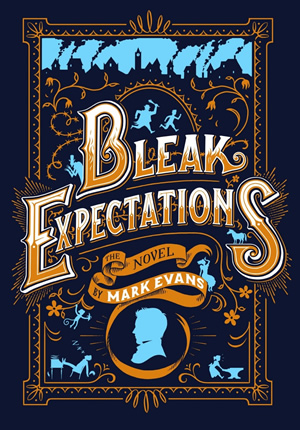
Fingers crossed from us! You've written a new Bleak Expectations book - a perfect Christmas present. Could you tell us more about that?
Yes, I have written a book. It's an adaptation of the first radio series, and done as if it is Sir Philip's memoirs, with me having discovered and edited them and added footnotes as if it was a Penguin Classic. The footnotes were great fun - a different way to write Bleak Expectations related jokes.
I've always wanted to write a novelisation of the series, and with it being the Dickens bicentenary year it seemed the perfect time for it. So I adapted the first episode and my literary agent sent it out. Then we made every publisher who was interested fight over the manuscript in what I can only describe a fight-pit of death until the tremendous James Gurbutt of Corsair emerged, bloody and torn but clutching the pages in his hand and screaming 'I will have this book, in this life or the next!' Or it may have happened via some emails and phone-calls, I forget.
To get the book out for Christmas I ended up writing it in parallel with the current radio series - and I'm ashamed to admit there are at least two jokes which appear in both. Boo for me. (But I think they're pretty decent ones...)
It's a faithful adaptation of the first series, but with more... stuff. The plot is a tiny bit different, and you find out more about certain characters - specifically the mysterious Aunt Lily. And there are loads more jokes. Plus, I have done one small cheaty thing - or retconning as I believe it's called - in that on the radio, Harry doesn't say 'harrumble!' until Series 2; but in writing the book I thought 'I can't have Harry not saying that...' so he now says it earlier than on the radio. Which might play havoc with people's minds, so sorry...
You're right, it would make the perfect Christmas present. It's got a brilliant, shiny cover so looks great; and if you don't want to actually read the thing, it is the perfect height to use as a corrective support for neck problems and also made of specially insulated paper that means it would work brilliantly as a house-brick.
The book contains, much like the radio show, delicate turns of phrase, carefully scripted footnotes, detailed appendices - including the full name of Pip's father's lawyer at last! It's a blistering comic pace... do you ever wish you'd set yourself a less time-consuming-to-create style of comedy?
Oh yes. Often. But I am terrified of boring people. So I try and cram in as much stuff as I can, be that a full-blown joke, a silly word or just too many adjectives, some of which I will have made up. I like to think of it as a rich, dense fruitcake style of writing; but I am aware that not everyone likes fruitcake...
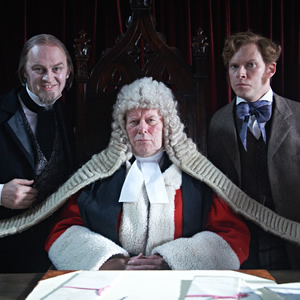
I've always loved joke filled silliness - I grew up on a lot of I'm Sorry I'll Read That Again, The Goon Show, Python and The Goodies. (When Graeme Garden [pictured] was in filming The Bleak Old Shop Of Stuff I quite embarrassingly kept going up to him and saying 'another of my favourite jokes you did was...') And perhaps those influences explain why I write the way I do.
The good thing with the book was the extra words. There are about thirty thousand words in a radio series, and the book is about ninety thousand... loads more to play with. And also because there were scripts to work from I knew I had characters and a story that already worked; as mentioned before, I find plotting the hardest thing so with a plot already in place I could just concentrate on making it as silly and funny as possible.
I often wish I could write a more naturalistic style of comedy... but I'm not sure I can. And if I ever tried a drama... well, it would almost certainly end up being facetious, undercutting itself at every turn and therefore possibly dreadful. I'm just pathologically scared of being dull in my writing.
I do put pressure on myself to try and be as densely funny as possible; if anyone has ever worked near me in the British Library (where I go most day to write) then I apologise for the times they've witnessed me suddenly stand up and pace around muttering 'it's not funny... it's not funny...'
Presumably if this book is a success you'd be up for writing one covering the next chapter of Pip's life?
Definitely. I would happily adapt all five series into books if someone asks me. Particularly as I haven't listened to Series 2 for a long time, so it would be nice to have an excuse to do that...
Finally, what's the deal with swans?
I honestly don't know. I think large-ish birds are just funny, aren't they? From the chicken upwards, with the swan being particularly hilarious. They're so pompous with their silent grace and only the Queen being allowed to eat them, yet also terrifying with their 'break a man's arm' reputation. Plus, 'swans!' is just a funny thing to say. Isn't it? Certainly is when the irritatingly talented-to-the-level-of-genius James Bachman says it. I also have an obsession with the word 'horse'. But that's less prevalent in the series...
Thanks Mark for all your time, and such an interesting chat!
Bleak Expectations is on Radio 4 on Tuesdays, catch up on iPlayer. It's regularly repeated on Radio 4 Extra too. The previous series are available on CD. Details
'Bleak Expectations The Novel' is in all good (and some bad) book shops, or you can buy online

